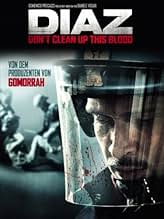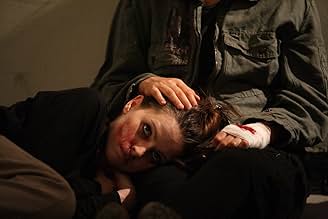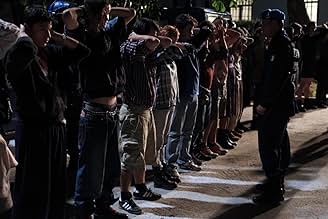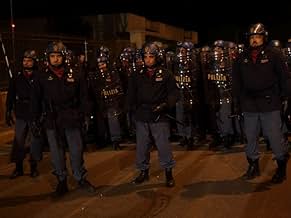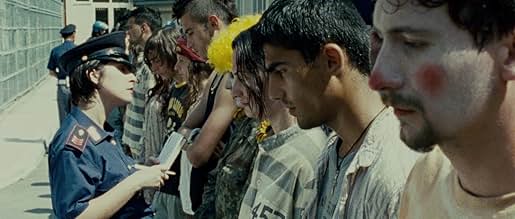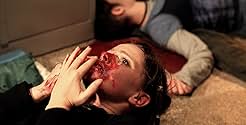IMDb RATING
7.3/10
4.1K
YOUR RATING
A reenactment of the final days of the 2001 G8 Summit.A reenactment of the final days of the 2001 G8 Summit.A reenactment of the final days of the 2001 G8 Summit.
- Awards
- 15 wins & 23 nominations total
Featured reviews
The movie says: Don't clean up the mess, as in let the world see what happened. As you can tell by that, the movie is based on true events. Very harrowing and very powerful. The performances are pitch perfect. Small events enroll and you can see that something big will happen. The movie emphasizes that one scene is very important (one event if you wanna call it that) and it gets repeated. Now don't judge the movie on the bad cgi in that scene, if you can.
And as the other reviewer has said, it might have its flaws, but its message is very clear and it should have played at the big screen at the Berlin International Film Festival. The other reviewer also stated there's another movie called Summit, which I know will seek, which seems to be reveal even more of what happened, but more in a documentary style. This one reminded me a bit of the American movie "Battle in Seattle" ...
And as the other reviewer has said, it might have its flaws, but its message is very clear and it should have played at the big screen at the Berlin International Film Festival. The other reviewer also stated there's another movie called Summit, which I know will seek, which seems to be reveal even more of what happened, but more in a documentary style. This one reminded me a bit of the American movie "Battle in Seattle" ...
Sometimes you see a movie about something was really happened. And you were there, at that time. And you don't want to forget. You want nobody will forget. I think this movie is well done, maybe not a real artistic masterpiece, but I don't think this was the target for the director. The real target was just to document real fact as they happened. And if facts were not really that way the director and the producer would surely have problems with law. No problems happened. Sadly, I would prefer to know that this film was fictional and the policemen did their job in the right and humane way. I would really like "Diaz" was just a fiction. But it is not. By the way, I'm from Genova and I was there at the time. Not inside Diaz school, fortunately.
What happened on that day and is portrayed in the movie is nothing new.
All of us have seen what happened in Abu Ghraib, concentration camps, even on socker matches or concerns... we all know that people behave like swine when they are given the opportunity and even worse, when they are in "authority" (in any sense).
I have tried to read a book by psychologist Philip Zimbardo, that explains the topic of violence brought in common people if they are given an order or authority to do so... couldn't, it didn't feel realistic enough to follow. I saw the Experiment, based on his work and didn't find it realistic again - it felt like fiction.
Than this movie came. I seriously would make it an obligatory part of police and soldier training. To show them what they can become if they don't watch themselves... I would show it on psychology lessons to make the students understand that the beast in us is very much alive. Its a movie that partly kills the "humans are nice" mindset, but sometimes it needs to be done - the risks of forgetting are too high.
When I left the cinema I was thinking if there is anything that can be done from MY side to prevent such things from happening... All i came to was to be good - to spread the feeling of connection with strangers, to try and make any matter personal. This movie made me consider joining the police just to see and try to not allow anything like this to happen. Thank you for this, I don't know what will be my role, but movies like this make me realize, that living for my own self is just not enough (one day I might be sorry for doing so.. if I find myself on the wrong end of the baton).
All of us have seen what happened in Abu Ghraib, concentration camps, even on socker matches or concerns... we all know that people behave like swine when they are given the opportunity and even worse, when they are in "authority" (in any sense).
I have tried to read a book by psychologist Philip Zimbardo, that explains the topic of violence brought in common people if they are given an order or authority to do so... couldn't, it didn't feel realistic enough to follow. I saw the Experiment, based on his work and didn't find it realistic again - it felt like fiction.
Than this movie came. I seriously would make it an obligatory part of police and soldier training. To show them what they can become if they don't watch themselves... I would show it on psychology lessons to make the students understand that the beast in us is very much alive. Its a movie that partly kills the "humans are nice" mindset, but sometimes it needs to be done - the risks of forgetting are too high.
When I left the cinema I was thinking if there is anything that can be done from MY side to prevent such things from happening... All i came to was to be good - to spread the feeling of connection with strangers, to try and make any matter personal. This movie made me consider joining the police just to see and try to not allow anything like this to happen. Thank you for this, I don't know what will be my role, but movies like this make me realize, that living for my own self is just not enough (one day I might be sorry for doing so.. if I find myself on the wrong end of the baton).
In July of 2001, over 200.000 people took to the streets of Genoa in protest against a meeting of the G8 - the group of the worlds' eight most powerful industrial countries whose summit decisions were to have a global impact on the world. In the aftermath of the protest, there were hundreds of injured, and 23-year-old activist Carlo Giuliani was killed when he confronted a Carabinieri vehicle. He was shot with a firearm and was ran over twice by a police Land Rover.
Day after this big anti-globalist protests in Genoa, the police organized a night raid on the Diaz school, where the temporary headquarters of the Genoa Social Forum was located, alongside with Indymedia - an independent media organization, as well as activist lawyers who provided free legal services to protest participants and collected documentation on the police brutality during the protests. At the moment when 500 members of the police and carabinieri stormed the building, there were around one hundred people sleeping inside, among them many journalists and young people who came from different European countries to take part in the protest.
The film relies on documentary material and depicts these events extremely realistically, especially the atrocious police beating of everyone they came across in the building, seriously wounding many people, causing some to sustain life-critical injuries and even coma. Those who did not end up on the life support in the hospital were arrested and transferred to a police barracks where they were abused and brutally tortured for several more days.
In addition to extreme brutality against activists, police destroyed a large amount of computer and media equipment, took all hard drives and destroyed all cameras they found in the building. After that, police officers went on to set up a false evidence campaign aiming to present this school as a black block stronghold, as well as an improvised hospital for people with existing injuries from the protests.
It is important to understand that this attack wasn't accidental in any way. It was planned at the highest levels of police and government. Besides destroying computer equipment and evidence against the police, the goal was to criminalize the movement and instigate a media lynching, but also to deeply traumatize a large number of activists and thus passivize or break the protest movement.
The gruesome police violence during the Diaz raid that is presented can be compared with the cult film "The Strawberry Statement", which covers the Columbia University protests of 1968 and the brutal intervention of the US Police and National Guard.
Particularly interesting is the fact that afterward no police officer was tried for torture, because in 2001 the Italian law did not recognize torture as a criminal offense. Movie scenes of humiliation and torture that took place after the transfer of the arrestees into the police barracks are irresistibly reminiscent of films about military-fascist dictatorships in Latin America. It's the same politics, the same method, the same interests.
This film should be a kind of a lesson to anyone involved in any protest or social movements. Know what to expect if a protest actually jeopardizes someone's interests - in the sense that every social conflict is part of the struggle between social classes. Although this struggle is mainly of low intensity, contended to individual strikes and protests, if a movement actually threatens the interests of the ruling class, the conflict will soon turn into a class war in which the ruling class won't choose the means, nor heed to victims.
It is therefore crucial to understand the class nature of the society we live in, and the implications it has. One certainly shouldn't be naive and think that the state and the police have anything to do with law or justice.
Day after this big anti-globalist protests in Genoa, the police organized a night raid on the Diaz school, where the temporary headquarters of the Genoa Social Forum was located, alongside with Indymedia - an independent media organization, as well as activist lawyers who provided free legal services to protest participants and collected documentation on the police brutality during the protests. At the moment when 500 members of the police and carabinieri stormed the building, there were around one hundred people sleeping inside, among them many journalists and young people who came from different European countries to take part in the protest.
The film relies on documentary material and depicts these events extremely realistically, especially the atrocious police beating of everyone they came across in the building, seriously wounding many people, causing some to sustain life-critical injuries and even coma. Those who did not end up on the life support in the hospital were arrested and transferred to a police barracks where they were abused and brutally tortured for several more days.
In addition to extreme brutality against activists, police destroyed a large amount of computer and media equipment, took all hard drives and destroyed all cameras they found in the building. After that, police officers went on to set up a false evidence campaign aiming to present this school as a black block stronghold, as well as an improvised hospital for people with existing injuries from the protests.
It is important to understand that this attack wasn't accidental in any way. It was planned at the highest levels of police and government. Besides destroying computer equipment and evidence against the police, the goal was to criminalize the movement and instigate a media lynching, but also to deeply traumatize a large number of activists and thus passivize or break the protest movement.
The gruesome police violence during the Diaz raid that is presented can be compared with the cult film "The Strawberry Statement", which covers the Columbia University protests of 1968 and the brutal intervention of the US Police and National Guard.
Particularly interesting is the fact that afterward no police officer was tried for torture, because in 2001 the Italian law did not recognize torture as a criminal offense. Movie scenes of humiliation and torture that took place after the transfer of the arrestees into the police barracks are irresistibly reminiscent of films about military-fascist dictatorships in Latin America. It's the same politics, the same method, the same interests.
This film should be a kind of a lesson to anyone involved in any protest or social movements. Know what to expect if a protest actually jeopardizes someone's interests - in the sense that every social conflict is part of the struggle between social classes. Although this struggle is mainly of low intensity, contended to individual strikes and protests, if a movement actually threatens the interests of the ruling class, the conflict will soon turn into a class war in which the ruling class won't choose the means, nor heed to victims.
It is therefore crucial to understand the class nature of the society we live in, and the implications it has. One certainly shouldn't be naive and think that the state and the police have anything to do with law or justice.
Seriously. I walked out of it somewhat disorientated and still shaken. I saw 'Diaz - Don't clean up this Blood' about a month ago at its Berlinale Screening and it still haunts me. I could tell that most of the audience shared my feelings and some even left the cinema, because they couldn't bear what they were seeing. Nevertheless the applause was extraordinary.
We have all seen our fair share of violence and cruelty in the movies. But this is a completely different pair of shoes. The non-fictional background of the film plot concerns me personally, both as a human being and as an European citizen. It's hard to imagine this happened ten years ago in a Western European country and yet it DID happen and it could - and probably will - happen again. That's why it is so important to deal with the topic of police violence instead of ignoring it or playing it down. The film crew and cast did a great job capturing the horror of this disastrous event. And that's what 'Diaz' mainly seems to be about: re-creating and contextualizing the occurred violations of human rights in 2001 in Italy as authentic and accurate as it can be done in a feature film.
It obviously wants you to be shocked, but with good reasons: it describes shocking incidents, which should not be trivialized. If you do some research, you'll find out that the film indeed does not exaggerate anything. But it does NOT inform you about the political background, you have to inform yourself. And I think you will, after you've seen it.
'Diaz' is not entirely flawless, but it could be a film of great significance, provided that it motivates the audience to read up on the subject.
If you're interested in a less gripping, but much more informative approach on the matter, check out the documentary "The Summit" (2012).
We have all seen our fair share of violence and cruelty in the movies. But this is a completely different pair of shoes. The non-fictional background of the film plot concerns me personally, both as a human being and as an European citizen. It's hard to imagine this happened ten years ago in a Western European country and yet it DID happen and it could - and probably will - happen again. That's why it is so important to deal with the topic of police violence instead of ignoring it or playing it down. The film crew and cast did a great job capturing the horror of this disastrous event. And that's what 'Diaz' mainly seems to be about: re-creating and contextualizing the occurred violations of human rights in 2001 in Italy as authentic and accurate as it can be done in a feature film.
It obviously wants you to be shocked, but with good reasons: it describes shocking incidents, which should not be trivialized. If you do some research, you'll find out that the film indeed does not exaggerate anything. But it does NOT inform you about the political background, you have to inform yourself. And I think you will, after you've seen it.
'Diaz' is not entirely flawless, but it could be a film of great significance, provided that it motivates the audience to read up on the subject.
If you're interested in a less gripping, but much more informative approach on the matter, check out the documentary "The Summit" (2012).
Did you know
- TriviaDirector Daniele Vicari watched 700 hours of video footage for research.
- SoundtracksEvolution, Revolution, Love
Performed by Tricky
- How long is Diaz - Don't Clean Up This Blood?Powered by Alexa
Details
- Release date
- Countries of origin
- Official site
- Languages
- Also known as
- Cuộc Bạo Động Đẫm Máu
- Filming locations
- Production companies
- See more company credits at IMDbPro
Box office
- Budget
- €6,453,637 (estimated)
- Gross worldwide
- $2,621,201
- Runtime2 hours 7 minutes
- Color
- Aspect ratio
- 2.35 : 1
Contribute to this page
Suggest an edit or add missing content

Top Gap
By what name was Diaz: Un crime d'état (2012) officially released in Canada in English?
Answer
